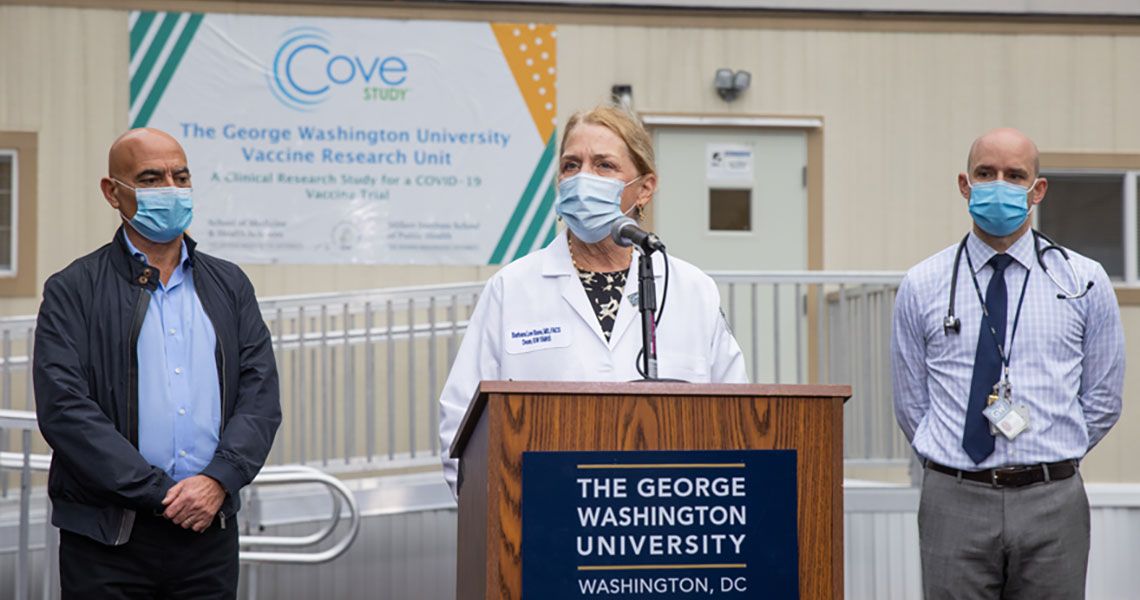Moncef Slaoui, PhD, MBA, chief adviser for the U.S. Department of Health and Human Services’ COVID-19 vaccine development initiative Operation Warp Speed, visited the George Washington University Wednesday to raise awareness for the national vaccine development efforts, encourage greater participation in the clinical trials and recognize GW for exceeding its enrollment goals for its vaccine trial.
Slaoui, the former head of GlaxoSmithKline’s vaccines department, now manages the $10 billion federal government effort to develop a vaccine alongside Operation Warp Speed’s CEO Gen. Gustave F. Perna.
GW is one of roughly 100 sites conducting a Phase III COVID-19 vaccine trial led by the COVID-19 Prevention Network, established by the National Institute of Allergy and Infectious Diseases (NIAID), one of the National Institutes of Health (NIH).
Across the country, research teams — including at GW — are testing the mRNA-1273 vaccine, co-developed by NIAID scientists and biotech firm Moderna. The vaccine uses the chemical messenger ribonucleic acid, or RNA, that instructs the body’s cells to create a protein that mimics one found on the outer surface of SARS-CoV-2.
“Congratulations on a very well-run site,” Slaoui said. “I also want to thank the volunteers at this particular site [and] the almost 30,000 participants in the Moderna trial, as well as the 45,000 volunteers in the Pfizer trial, who are taking a step to help show whether or not the vaccine works.”
Slaoui met with GW site principal investigator David Diemert, MD, professor of medicine at the GW School of Medicine and Health Sciences (SMHS) and a physician in the Division of Infectious Diseases at The GW Medical Faculty Associates (GW MFA). He also toured the clinic site on the corner of 20th and H streets with Barbara L. Bass, MD, RESD ’86, vice president for health affairs and dean of GW SMHS and CEO of the GW MFA.
“We are excited to demonstrate to the D.C. community what the George Washington University has accomplished in partnering with Operation Warp Speed and serving as a vaccine trial site,” Bass said as she welcomed Slaoui. She also took a moment to thank the more than 350 volunteers at the GW trial site, which has had great success enrolling participants.
“GW’s pool of volunteers is particularly diverse,” Diemert said, “and representative of the Washington, D.C., community.” Roughly 50% of the trial participants are either Black or Latino, and at least a quarter have at least one comorbidity such as heart disease, severe obesity, HIV or diabetes.
Nationwide, about 30% of trial participants are from underrepresented groups. Diemert credited GW’s enrollment success and the diversity of the university’s trial participants to the extensive community partnerships SMHS and GW’s Milken Institute School of Public Health have built over the years, particularly the work of Manya Magnus, PhD, MPH, professor of epidemiology at Milken SPH, who leads the NIH-funded GW HIV Prevention Trials Network clinical research site, and Marc Siegel, MD, associate professor of medicine at SMHS and a physician in the Division of Infectious Diseases at GW MFA.
When addressing the pace of the vaccine development process, Slaoui identified several factors. The speed, he said, has been in part because the science has evolved so rapidly. “The virus looks like MERS and SARS1,” he explained. “We learned from those pandemics in 2001 and 2008, so we were able do the early experiments that normally take three to five years, in literally two to three months.”
The enormous financial investment provided by Operation Warp Speed helped as well. “We took financial risks, operational risks, and we had amazing support from the Department of Defense,” Slaoui said. “We were able to put together the clinical trials in a week or two for 100 sites, when normally it takes sometimes six months.” That, Slaoui explained, is how things have been able to advance so quickly without compromising safety.
Clinical trial participants are monitored regularly for symptoms, side effects and presence of COVID-19, with follow-up continuing for two years after the second dose of the vaccine. Participants also are asked to keep an e-diary recording any potential symptoms. According to Diemert, so far, only one of the participants at the GW site has tested positive for COVID-19.
“Once the number of participants with symptoms and a positive COVID-19 test hits a target number across all of the testing sites,” he explained, that triggers a review of the data. “The estimate for the first interim check currently is the end of November, but that is entirely dependent upon the number of cases recorded across all of the trial sites.”
Once the data analysis is triggered, an independent Data and Safety Monitoring Board will determine the number of COVID-19 positive study participants in the placebo group versus the vaccine group to assess the vaccine’s effectiveness.
“We are on the verge of learning in the next few weeks whether these vaccines work, when only 11 months ago we just discovered the virus,” said Slaoui, adding, “that’s never been done before.”



